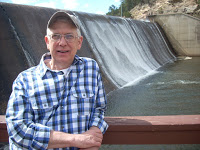Years ago I’d escape to the hideout in the attic of the garage where this boy with no brothers hung out with boy friends. I’d sometimes go there alone or at least sit downstairs in the garage with my dog Tippy. In Jr. Hi years I’d close the door to my room. I’d matured and moved from sharing a room upstairs with two sisters into my own bedroom across the hall from my parents. Mom consulted with me about color and I ended up with dog wall paper—a mix of portraits of several dog species. Having my own room was great. It was my escape and it had a door! I did my projects and reading there. I enjoyed the solitude.
My friends and I made escapes to the countryside—both on our own and with the Boy Scout troop. We’d hike or ride bikes, or sometimes pull our sleds through the snow. With Scouts we were driven to a campsite south of town where hundreds of years before Native Americans had camped, grown crops, and lived out their summers, one of my favorite places on my great grandparents’ homestead. Kansa and earlier tribes had lived in the valley for centuries. While there I had the further escape of dreams and imagination. I knew I was camping and swimming with Indians long gone from the place.
My other great escape took form in 8th grade with my discovery of the historical novel. I started with James Fenimore Cooper’s stories, The Spy and The Last of the Mohicans, but then found more by contemporary writers like Kenneth Roberts’ book Arundel. I was hooked and spent much of my escape time tramping through forests and prairies with explorers and pioneers, spies and troops, and American Indians of many tribes. Books are still a major escape for me.
Escape is an important factor in personality development (as Don Johnson might point out), to independence (as my daughter would avow), to maintaining long-term relationships (as I testify, both as related to my 29-year marriage and 32-year career in churches). I found meaningful the saying: when a minister leaves one congregation for another, it’s turning in one set of tired problems for a set of new ones.
I still need escapes in retirement. They relieve pressure. Some days escape takes the form of going for coffee, having lunch out, searching a public library, or visiting a museum. These mini-breaks remind me of childhood’s yearly one-week vacation trips with the folks. I recall the morning we woke up in the tiny motel room where we’d slept. Dad complained about how the blinking red neon sign announcing “FULL” had kept him awake, but then, putting his arm around Mom said, “But in all it was a really good night.” My junior-high eyes and ears realized that while we kids slept, Mom and Dad had sex. I’m committed to working hard and then escaping to a change of pace or another book. I guess my upbringing taught me that.
© 19 February 2018
About the Author
Phillip Hoyle lives in Denver and spends his time writing, painting, and socializing. In general he keeps busy with groups of writers and artists. Following thirty-two years in church work and fifteen in a therapeutic massage practice, he now focuses on creating beauty. He volunteers at The Center leading the SAGE program “Telling Your Story.”
He also blogs at artandmorebyphilhoyle.blogspot.com
